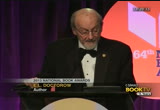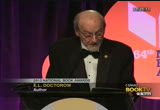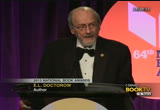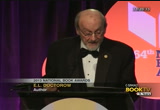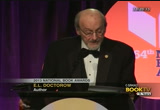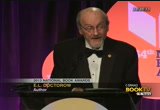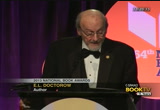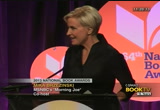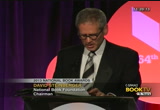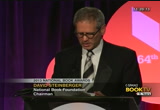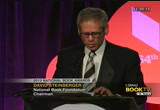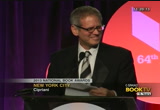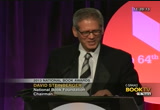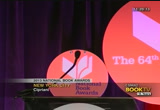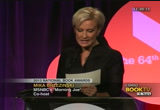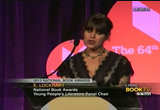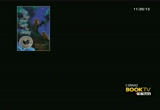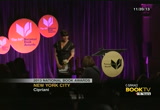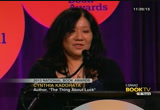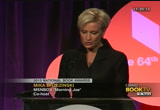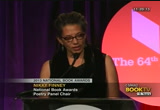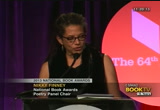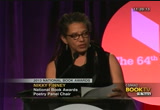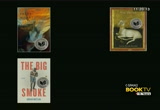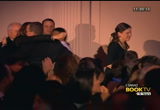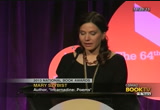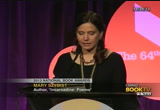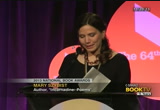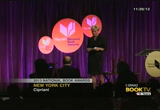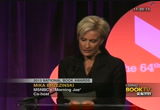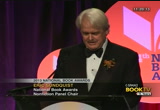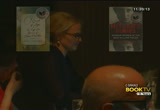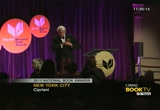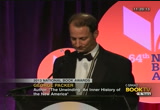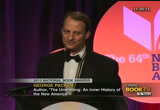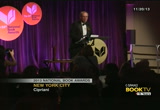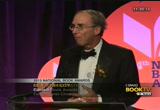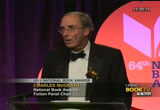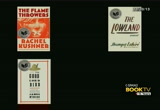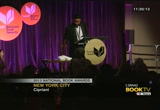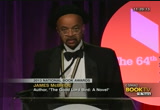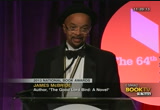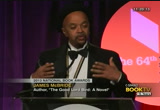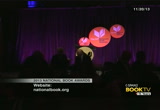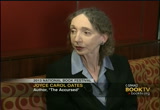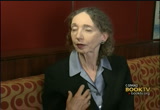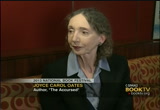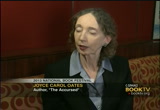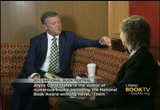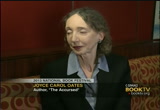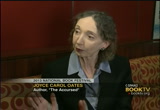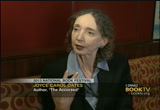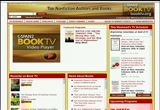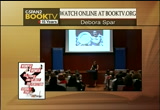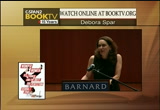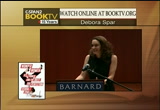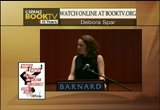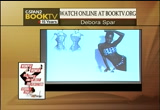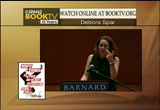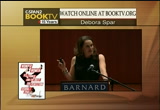tv Book TV CSPAN November 23, 2013 9:00pm-10:01pm EST
9:00 pm
so emerson would appreciate internet. the universe is the possibility of being imported suggests endless subscription and infinite surprise. and he might emerson after drinker to think of global internet activity is the kind of oversoul. on my part i think less mystically oven over brain. you will find in the relevant wikipedia entry, yes wikipedia entry, the visualization of routing paths for a portion of the internet. what makes the picture uncanny is it might easily be mistaken for a cross-section of the brain ..
9:01 pm
the life substance of the companion world in cyberspace. mind and invasive expedition in the name of commerce or government surveillance. for the use of corporations, and excited police departments, you can call it quantify indication. it in the 'out of we called it reification. kind of dehumanizing and so it
9:02 pm
turns out that the story for all of this, oddly enough, is the eviction story from the bronze age telling of the consequences coming from eating of the fruit of the tree of knowledge. so like all world, it comes with the heaven and the hell. what does u this mean for all of us in this room? we writers and our publishers? we don't want to give up the presumably inconvenient thing we do. something as old as paginated written narrative. we don't want to lose heart in frank norris, the author of "naturalistic works of fiction" in the '60s. norris despaired of the western union telegram. ten words and stop. the twitter of today. he feared it was the end of literary discourse.
9:03 pm
people could express themselves completely in ten words. the human mind would eventually be inexcess -- assessable. that was norris' idea. but he also believed the typewriter was an the enemy of creativity and how much more was imparted to a sentence written by hand rather than machine. we don't want to be today's norris. silly fellow he was. as there are those today who think writing on a computer is the death of great fiction. writers thrive on adversity. and ever since god stopped writing and humans took over the task. but there are internet i did -- dianamic that challenge us. concerns in the interactivity one of the web's world waiving flags. the techies don't want to know that reading a book is an
9:04 pm
essence of interactivity. where the readers life flows through the sentences and electric sir candidate, animating them and bringing them to life in the mind. only when a book is read it's completed. nothing else is directive as that. the ability to live in an extended discourse. so that isn't the problem. nor is the major problem the digital undercutting of office copyright and pirating of text equivalent to musician. it's a problem. you may have read a few days ago a result of a survey connect -- conducted by pen. they are engaging in self-censorship by avoiding
9:05 pm
research on certain controversial topics choosing not to engage sensitive conversations, and declining two particular topics and stories when pursue particular topics and stories when doing so might lead to scrutiny by the u.s. government. so it's begun. that's slowly gathering ghostly darkness coming off the other world technology. a kind of chinese-like darkness maybe. we'll call it the first step down the stairs to the internet world's help. hard to believe as we gather here this evening flourishing example of western democracy. but the strug the has begun to as whom rule the world. government data miners and the corporations that lead with them, or anyone else we'll have to take a deep breath, gather
9:06 pm
ours, and reluctantly or not join that struggle. i adopt have to remind us that everyone in this room is the free speech business. thank you. and my congratulations, again, to the wonderful short listed writers here this evening. thank you. ♪ [applause] ♪ >> well, that was beautiful. thank you, sir. i'm i'm frightened to ask this question. how many of you here tweet? [laughter] anybody? to distinguish an audience. i got one. there.
9:07 pm
any others? this have is a #. okay. and i'm a professional of self-yes, if you want to call me over. we invite you to enjoy dinner. we will return, of course, for the continuation of the national book awards ceremony. [inaudible conversations] ♪ ♪ >> good evening. on behalf of the board of directors and the national book foundation, it's my privilege to welcome you to the 64th an usual national book awards. now it's been my privilege to do this for the last seven years, but i've never done it with such a crowd. we have more than 700 people here today. i thank each of you for being here for the special event.
9:08 pm
[applause] now one of the things that makes this evening so special it's a night where our literary stars come out. we have incredible writers. some of the greatest writers here i'm going to mention a few of them. i ask you to hold your applause until i get through the list. it's hard. it's an amazing list. we have with us tonight winners of the national book award. edward ball. of[reading names] pulitzer prize winners, michael cunningham, allen taylor, lawrence right, macarthur fellow.
9:09 pm
9:10 pm
harper cool l lynns, mick mill less than. thank you for your support. couldn't do it without you. [applause] i would like to knowledge in our audience something special the winners of our fifth annual innovation and reading prize funded bit eleven gear foundation. it's about recognizing great writing and encouraging the -- reading of great books. they make it happen.
9:11 pm
changes young underprivileged teens to provided them with banned books. sosome of the greatest books are banned by authors like mark twain and earnest hemmingway, and world reader based in seattle, washington provides e-books to poor children in sub saharan africa. i'm going to ask the winners of the innovations and reading prize to stand and be recognized. let's give them some recognition for this great work. [applause] all right. now a few years ago people didn't think we were serious when the national book awards added an after party.
9:12 pm
as many of you know it's become a hot ticket. in fact, the first time we did it it was oversubscribed. i couldn't tell anyone where it was. if you want to go you have to hunt somebody down and get him to tell you. we figured out we need lot of space. we do it right here at the upstairs at the end. everyone is invited. we have to thank our after sponsor. our after party committee. our spirited after party committee. she's watching the ceremony from the post in antarctica. that's going on. [cheering and applause] okay. a few more people to thank. we want to thank our host and having me on "morning joe" to announce the finalists.
9:13 pm
to tina brown for helping us announce the list. our special thanks to the co-chair. if you came to the dinner for four years ago you know what i'm talking about. [applause] thank you. and finally, need to acknowledge the national book foundation terrific staff, our tireless director harrold, my colleagues on the board of directors who have been terrific. and now on behalf of the foundation, good luck to all of our finalists tonight, and on to the awards ceremony. ♪
9:14 pm
okay. are we ready? that dessert was yummy. okay. it's now time for what we've all been waiting for. the actual national book awards ceremony. the order of the award categories will be this: young peoples' literature, poetry, non-fiction, and then fiction. so to present the national book awarded young peoples' literature is e. lockhart. her most recent book "real live boyfriend." the fourth book in the ruby oliver series. it gives me great pleasure to introduce e. lockhart.
9:15 pm
♪ everyone in this room, you are here because once upon a time you fell in love with a book. if it happened at 3, perhaps it was "the snowy day." if at eight, perhaps "harriet the spy." if at 14, perhaps "the outsiders" in any -- case it was probably a children's book. the young peoples' literature category is a category of books that make readers for life. books that are read over and over that are clutched to the chest, and adored. i'm proud to have serve order the ypl committee with librarian lisa. author and seller peter glassman. novellest and nba finalist deb,
9:16 pm
and writer, novelist seal cecil. we looked for books that resonated with us long after the first read. we chose books we felt were modern classics. we believe readers will clutch to their chest and adore. books that make readers for life. the finalist in the young people s' literature category are. ka this, hi appelt. "the true blue scouts of sugarman swamp." "far, far away" by tom mcneil. "picture me gone" by
9:17 pm
megarosoff. "boxers and saints." by gene luen n yang. [cheering and applause] we, on the committee, loved these five books with the crazy passion of teenage love and the sticky open hearts of toddlers. this year's national book award for young peoples' literature goes to cynthia kadohata for "the thing about luck." ♪ ♪ ♪
9:18 pm
♪ hi. i don't have a speech because i'm wildly, wildly surreptitious. i thought it would be bad luck. maybe i did the right thing. i want to thank everyone at simon and shuster at every level and step of the way. they have incredibly great people. my editor, i adopt think there's a better editor in new york. that would be impossible. john anderson, justin for being so supportive of their team and the writers. russell gordon who designed the cover. paul and the team.
9:19 pm
every time she works on one of my books. the fabulous agent. i want to say to same and george, if you were here, you inspire every breath i take. thank you. [cheering and applause] ♪ >> okay. to present the national book award for poetry is knicky finney. she's the author of four books of poetry "head off and split "which won the 2012 national book award. the world is round, and "on wings made of gauze." she's recently accepted the
9:20 pm
position of john h. bennett, jr. chair at the university of south carolina. it is my pleasure to introduce nicky finney. ♪ ♪ >> good evening, everybody. i stand before you on behalf of the amazing poetry judges that make up this year's panel. ada limon. da powell, jahan ramazani, and craig morgan teicher. so it is in the spirit of
9:21 pm
william carlos william, robert warren, mary ann moore, lou sill clifton, ruth stone, gene valentine. i and i share with you in june of 2013 they began arriving at our door like eggs. 12, sometimes 6. sometimes two to a carton and a box. poetry books federal government -- fitting in besides each other so friendly. not resembling competitors but rather something we could pick up, take out, eat, and as a result live forever. some arrived in the old, old way as if sent from the great butcher shop on the corner. wrapped with brown butcher
9:22 pm
paper. the edges carefully taped down on the spine. one even cross bow tied with brown twine as if something was inside waiting to spill. something more than blood and bones. most were madison avenue full dressed. some came only in simple mylar. the surface far from revealing the rich water. the fully made up faces would arrive later in the summer. we opened them. and soon began finding them all 208 of them stacked by our beds, in the front room where the reading light was better, or there in the kitchen with the other food. some slid to our work bags by mistake. we peeled back their thin shells letting the poetry there cover us. letting their world invite and
9:23 pm
9:24 pm
9:25 pm
9:26 pm
it at all? there's plenty that poetry cannot do, but the miracle, of course, is how much it can do. how much it does do. so often i think i know myself only to discover in a poem, a difference, an otherness that resonates where i find myself as well as stephens once put it more truly and more strange. it is what some describe as full making. i count myself among them. i think often of the words of paul connelly who said, "i believe it is not arguing well but speaking differently that changes a culture ." poetry is the place where speaking differently is the most prevalent. speaking differently is what i
9:27 pm
aspire to and what i so adamantly admire and the poetry of adrian, matt, frank, lucy. i am amazed to be in your company. thank you, alice janes book for publishing my first book. thank you for publishing this one and taking care with it. i'm grateful to so many. i want to especially thank gabrielle will rice who inspired so many of these poems. michelle glazer and my brother for helping me through them. thank you to my husband, jerry harp. the heart to whom i speak for everything. and final thanks to my family. my family. and especially to my mother who made me. thank you.
9:28 pm
9:29 pm
that's seriously cruelty to fiction writers. i'm sorry. [laughter] okay. the national book award for non-fiction. are we good now? [laughter] will be presented by erick sun qis. the author of "to wake the nation". the christian award for best book in the humanities, and the choice outstanding academic book award. she's chair of the department of english and andrew w. melon professor of humanities at johns hopkins university, a great school. it gives me great pleasure to introduce eric sundquist.
9:30 pm
[applause] >> good evening. it's a great pleasure to be here. on behalf of my fellow panelists, let me thank the national book foundation for the privilege of judging this year's nominations in the category of non-fiction. perhaps i can speak for all of us and saying that in a lifetime of reading, i have not had a more gratifying, surprising, and educational experience. we had the pleasure of reviewing hundreds of books. 500 plus to be specific. across an exceptional wide range of genres and topics. everywhere encountering contemporary american writing at it very best. i'm sure all of us at one point or another, looked back with envy to the 20-year period from
9:31 pm
the mid '19 out of to the mid '80s when multiple awards recognizing as many as eight different categories of non-fiction were presented. for us; however, all of those categories were crowded in to one. and much as we would have loved to present many awards, we had first to narrow many super works down to a list of ten then down to these five finalists. "book of ages: the life and opinions of jane franklin" by jill lepore. [applause] "hitler's furies: german women in nazi killing field." wendy lower. published -- [applause] "the unwinding: an inner history
9:32 pm
of the new america" by george packer. [applause] "the internal enemy: slavery and war in virginia, 1772-1832 "by allen taylor. "going clear: scientology, hollywood, and the prison of belief" by lawrence wright. [applause] this year's national book award in non-fiction goes to george packer. [cheering and applause] ♪ [cheering and applause] ♪
9:33 pm
9:34 pm
thank you to danielle and david and others at the new yorker for giving me just the right balance of freedom and editorial brilliance. thank you to my friend, dexter for being there from the start. to my mother and sister nancy and ann packers. writers both so they understand. my children, charlie and julia. i won't say you made it any easier but you made it a lot more fun. [laughter] to laura, my love, thank you for sharing my life and my work. i can't imagine either one without you. and finally, i want to thank dean price, tammy thomas, jeff, and other americans who gave me the great gift of trusting me with their stories and allowing me to their lives so i could try
9:35 pm
to ill -- illuminate some of what has gone wrong in america over the past generation. and in their own lives some of what has gone right. thank you very much. [cheering and applause] ♪ ♪ >> and now i'll introduce the man who needs no introduction because i already introduced him. [laughter] charles mcgrath. [applause] ♪ >> there were 407 nominees for the national book award this year. that's up about 100 from 2012, which suggests that the writing of fiction may be a growth industry in america.
9:36 pm
[laughter] these books came from small publishers, from big publishers, from university publishers, and self-publishers. from old masters and first-timers. they came in the mail, in a variety of formats. in hardbacks, paperbacks, gallies, loose manuscript, and loose leaf binder. one book, an epic novel of hawaii came in a copy of a not all of these books were good. [laughter] but many more than not performed that magical trick of prose. the one that never gets tired no matter how many books we read. the trick that takes you out of your self and drops you down in
9:37 pm
another place and in another life. a great many of the books we read were not just good but very, very good. national book award this year for the first time the welcome thing of substitute -- instituting a long list of ten books. my fellow judges and i could easily have doubled that. the task of getting from ten down five down to one, at times, seemed arduous, unfair, and even cruel. a reminder that the business of giving literary awards worthy as it is. has the unfortunate effect of leaving out books that are almost equally deserving. eventually, my fellow judges and i got to one, and i thank them for their diligence, their scrap louseness, their fair-mindedness, intelligence,
9:38 pm
and hard work. those judges are charles baxter, gish jen rick simonson, renne may. the finalist for the national book award this year are the "flame throwers" by rachel curber in. "the low land" by jhumpa lahiri. ed" good lord bird" by james mcbride. "bleeding edge" by thomas pynchon. "tenth of december" by george
9:39 pm
9:40 pm
today. i would like to say that i was reading today a note to myself about what happened in may 2004 on long island when el dutch gave the commencement speech. and he spoke out against the war and the kids there booed him. i remember saying to myself somebody ought to say something. somebody ought to go something. think about this man at 73 years old. having the sector of his life lived through -- lived through and witnessed, at least, to some degree, the holocaust in the '50s and '60s and body of work and desire to speak the truth and to serve as a kind of things of truth for us. and i really didn't do
9:41 pm
anything. and when i saw him speak tonight, i once again was reminded that we have a lot of work ahead of us. and i'm so proud to be part of a community that at least thinks like that. rachel or thomas or george won tonight, i wouldn't have felt bad. they are fine writers. it sure is nice to get it. [laughter] [applause] woe had a bad year this year. those of you who know, ben crammer passed away. it was a difficult thing for all of us who knew and loved him.
9:42 pm
i'm thankful and the susan of the kennedys. [laughter] [cheering and applause] and to my daughter and children. you know, when i wrote this book, my mother died in january of 2010. my niece died a couple of weeks later. then my marriage fell apart. but it always nice to have somebody whose world i can fall in to and follow him around. that was onion and the "good lord bird."
9:43 pm
9:44 pm
c-span bus is parked on the mall. and on the bus with us right now is novelist joyce carol oalts. here is her most recent book. we don't often have novelists on booktv on c-span. but this is historical fiction in a sense, isn't it? >> guest: yes. kissell: how so? >> guest: i did a tremendous amount of research. it was the most pleasant part of the writing. in to princeton and vicinity in the years 06 when wilson was president of princeton. >> host: what was it like at that time? >> guest: it's kind of a representation of affluent,
9:45 pm
white, christian america generally. and princeton is an -- >> host: and wilson has a -- cameo in your book? >> guest: he's a principle character. and it's about wilson. he confronted by a demon. he's templed. and he -- i shouldn't say what happens. but he behaves nobly in the novel. he does represent many of the shortcomingings of people of his time such as he was a racist and sexist and other -- probably his most principle problem was that he thought that he was anointed by god. >> host: to what? >> guest: to be a leader. he was anointed by god. i don't think it's uncommon for some people to feel. politicians and statesmen and leaders. some of them are obviously psychopath logical. some are less obviously so.
9:46 pm
>> host: without giving away the plot. can you tell us about the course? ? >> guest: it means the white upper-class christian people who literally look the other way when the co clucks clan was operating in new jersey and elsewhere. black people were being lynched and hair -- harassed and tortured and murdered. it was like they see no evil, say no evil. that sort of thing. i thought there was a curse on the white race, basically. >> host: and up ton sinclair is in your book? >> guest: he was 26 years old. he represents a younger generation. he sort of rises in the rise of interest in equality among the
9:47 pm
races and sex is. it's about women's right and acquiring the right to vote. >> host: and john and governor -- grover. >> where do you get your ideas? >> guest: my ideas for that novel came because i came to live in princeton. i read some biography of wilson about prince son. i perceived in the biography a portrait of a person different from the sort of received notion of woodrow wilson as a novel person. i saw he had many flaws, and i saw that his self-rich useness of his is rectitude, his con desks -- he called black people negro and women needed to be examined. >> host: do you have any idea how many books you have sold? >> guest: no. >> host: any idea on how many
9:48 pm
awards you have won? >> guest: no. i don't sit around counting them. >> host: how do you write? >> guest: early in the morning. and basically love to write. to me it's very exciting. it's literally exciting to write. ism that i'm organizing thoughts that may be incoherent or chaotic and funneling them. i like to create dramatic scenes. the novel has a lot of expo suggestion. a history of basically each chapter is a dramatic scene. and something really happens at the end of a chapter. there's an ending and something else in the beginning. when the novel ends, it really ends. there's a resolution and the mystery is explained on the last pages. >> host: as you're write -- has your writing changed in the last 40 years? >> guest: it changed a lot. when i first began writing i had long paragraphs of narratives.
9:49 pm
describing things. now i have much more people talking, much more dialogue. i may have monologues. people talking. i try to evoke their voices of people rather than my own voice. >> host: write longhand or computer? >> guest: i start in longhand and i like to write. then i go to the computer and organize. computer is perfect for organizing and moving chapters and paragraphs around. positioning and repositioning. that's perfect. >> host: do you save your drafts? >> guest: i save many of my drafts, yes. i do. my archives at syracuse university. they are huge. it's like the grand canyon. it's filled with all the paper. >> host: why are your archives at syracuse when you teach at princeton. >> guest: syracuse is where i graduated. my b. a. is at syracuse. >> host: how long have you
9:50 pm
been there? >> since 1978. >> host: are you teaching in the semester? >> guest: i'm teaching now. >> host: what are you teaching? >> guest: two writing workshops, and i have two students who are doing though sis. >> host: do you pick the students? >> guest: to some extent. basically they are -- they apply to the program. and that i choose my thesis on. >> host: on the first day in class what do you assign? >> guest: oh, the first day of class we may go over in great detail a short story, a classic story. we may go over a hemmingway story. line by line. almost word by word. a story may be two pages long. we go over it carefully. i want them to see how it's written. the very best prose is written like protoi are. it's very nicely constructed. the other day, which is a couple of weeks ago, we did a ray story. and we spent about an hour on the story.
9:51 pm
so that's the first class. >> host: do you enjoy teaching? >> guest: oh yes, very much. >> host: why? >> guest: yes. well the students are interested and their writing is often engaging and original. i love going over hemmingway,let say, or faulker in. i love going over good prose when we are appreciating it. as i said, it's something like poetry. really good prose is written so carefully. with a number of sensitive young people to go through this and see how well it's written. it's really a pleasure. >> host: is writing hard work? >> guest: writing can sometimes be hard work or it sometimes be fluent. you know, it's like mo start creating music that came in to his head. and other composers refuse a little more. one may is almost too easy if it comes in your head and don't have revise. i like to have a first draft and
9:52 pm
revise it. that's my happiest situation. >> host: and if someone were to pick up one your books and said, which one of your books should i read? what would you say? >> guest: it depends on who you are. i have huge long novel like "blond" about marilyn monroe is 800 pages long. "zombie" is only about 140 pages. it you like short work, i have a novel called -- and that's very short. >> host: here is her most recent book. this is booktv on c-span2. visit book.org to watch any of the programs you see here online.
9:53 pm
i traced through the narrative of a woman's life. so the book after historical chapter looks at grills and how we rail girls and what expectations we as a society are putting on girls and young women. then it look at body image and how issue around body image are different for women still than men. it looks at sex which is a painful chapter to write. it looks at marriage, it looks at babies, housekeeping, workplaces. and really tries to follow through the arc of a woman's life. we don't have at love letters time. i just want to touch on three of these issues which captured in three different chapters. i have chosen them somewhat at random.
9:54 pm
you can probably, you know, sort of imagine it. let me start by talking about beauty. i don't suspect i have to argue too hard to convince people in this room or pretty much any room that we as a society still remain totally obsessed with women's bodies. and with women's bodies as subject of affection and perfectibility. if you go back to any of the feminist works it was one of the most important themes. we had to stop society's obsession with women's bodies. we had to move beyond beauty as a standard to raise over kinds of standardses for women. well, does anyone in the room think we have pulled it off? no. if anything -- i would argue this easily, we have instead once again, upped the ante for beau tenth annual -- beauty by which they are
9:55 pm
evaluated. pick up any women's magazine bhap is it about? beauty. you are supposed to look 11 until 92. you're not allowed to have wrinkle or gain weight. one is supposed to or assumed to be beautiful throughout the entire course of her life. and one of the things i do in the book, that some of you may have seen the glamour piece. i counted up how long it takes me not to look like a model. which i never will. but show up in the morning for work. it takes me longer than my husband. he uses a lot of hair product [laughter] even so. that's all about he has to do. if you think about what the standards are not for models but women a lawyer or a doctor or
9:56 pm
professor. there are standards that apply that actually are major constraints on women's time and energy and income. not a bad thing. but i think it's something that we have to be aware. what is a bad thing, as in the story we see that hillary clinton constantly. if when people are con slating assessment of women's qualification with their obsession with women's beauty. i was talking about this topic recently with someone who mentioned that she had just gone to an exhibit at one of the museums that included several courses. things women use to wear 200 years ago to make themselves more attractive. she was commenting isn't it great we don't have them anymore? and then her companion said, if you stop and think about it, maybe it was easier when women had corp. sets. if you think about it, you didn't actually have to work very hard if you wore a cor set it .
9:57 pm
may have been painful. now the expectations is that we're going retain the bodies without the help of the garment. what do you have to do instead is diet, exercise. which is arguably harder than putting on a garment. i'm not going to argue the point too much. i think it's interesting in our so-called liberation we, in fact, made it harder for women to achieve standards of beauty. because that woman in the garment is really has essentially the same shape as the woman who is sort of pick any model. more or less the same shape but without the advantage of mechanical intervention. let me turn and talk about marriage. you are a little bit young for this. let me throw the argument out. it's one of the mississippi ever more -- more interesting ones to write. it's not much written about marriage.
9:58 pm
marriage is essentially an economic contract. if you go back and look at marriage throughout history. if you look at the original marriage ceremonies in the jewish tradition is interesting. it's actually a contract. christian is several more variations. it's essentially an economic transaction that the family is giving away their daughter to her husband in exchange for something. land, cows, sheep, a dowry, but it's an economic transaction. and what the woman is giving is her have a ginty and the promise to have children. and many cultures if the women didn't produce children the marriage could be annulled. that was the deal. thank thankfully we're beyond that now. we don't enter no to marriage as
9:59 pm
an economic bargain. why are we still getting married? why interestingly has same-sex marriage taken over in such a huge way following essentially the same social conventions, which makes really no sense in the same-sex. we have actually fetishized the white wedding in a quite remarkable way given that it's really a visage of something that doesn't exist. what else? the other thing we have done, i'm going sound cynical. i think it's true. we have added a brand new ingredient in to the marriage contract. that is love. which is a good thing, but it's also ratcheting the expectations up. way back then love had nothing to do with marriage. again, it was a social and democratic bargain. it was very clear what both parties to the contract had to do. now we have thrown this messy
10:00 pm
119 Views
IN COLLECTIONS
CSPAN2 Television Archive
Television Archive  Television Archive News Search Service
Television Archive News Search Service 
Uploaded by TV Archive on

 Live Music Archive
Live Music Archive Librivox Free Audio
Librivox Free Audio Metropolitan Museum
Metropolitan Museum Cleveland Museum of Art
Cleveland Museum of Art Internet Arcade
Internet Arcade Console Living Room
Console Living Room Books to Borrow
Books to Borrow Open Library
Open Library TV News
TV News Understanding 9/11
Understanding 9/11